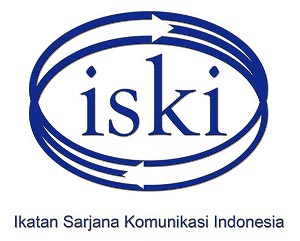PARADIGMATIS FENOMENOLOGI DALAM ILMU KOMUNIKASI (Studi Konstruksi Makna Realitas Media dan Komunikasi)
Abstract
Paradigmatic phenomenological interpretation of the reality is trying to trace the process of media and communications that are the essence of reality, not reality itself on engineering. Phenomenology as the study puts the study of communication in matters transcendental deity diterpakan by the media. Phenomenology based on the values of humanity as well as media that high menunjung Human Rights so that it can be done with hermenutik approach.
Phenomenology seeks to reveal the truth of the human senses as an empirical truth that is based on media exposure and other communication patterns.
Keywords: paradigmatic, phenomenology, construction, media, communication
reality
Full Text:
PDFReferences
Qodari, Muhammad (2010). The Professionalisation of Politics: The Growing Role of Polling Organizations and Political Consultants. In Budiardjo, Miriam, Prof. (2008). Dasar-dasar Ilmu Politik, Edisi Revisi. Jakarta: PT. Gramedia Pustaka Utama.
Cutlip, Scott M. et al (2000). Effective Public Relations. Eight Edition. New Jersey: Prentice-Hall, Inc.
Firmanzah (2007). Marketing Politik: Antara Pemahaman dan Realitas. Jakarta: Yayasan Obor Indonesia.
Foster, Steven (2010). Political Communication. Edinburgh: Edinburg University Press Ltd.
Harris, Kenneth J. et al (2007). The Impact of Political Skill on Impression Management Effectiveness. In Journal of Applied Psychology, 2007, Vol. 92, No. 1, 278-285.
Kotler, Philip & Neil Kotler (1999). Political Marketing: Generating Effective Candidates,
Campaigns, and Causes. In Handbook of Political Marketing, Edt. by Bruce I. Newman. California, USA: Sage Publications.
Lau, Richard R. & David P. Redlawsk (2006). How Voter Decide: Information Processing during Election Campaign. Cambridge, UK: Cambridge University Press.
Lees-Marshment, Jennifer (2001). The Product, Sales and Market-Oriented Party: How Labour Learnt to Market the Product, Not Just the Presentation. In European Journal of Marketing, Vol. 35, No.9/10, 2001, pp. 1074-1084.
Leary, Mark R. & Robin M. Kowalski (1990). Impression Management: A Literature Review and Two-Component Model. In Psychological Bulletin, 1990, Vol. 107, No. 1, pp. 34-47.
Lilleker, Darren G. & Jennifer Lees-Marshment (2005). Introduction: Rethinking Political Party Behavior. In Political Marketing: A Comparative Perspective, Edts. Darren G. Lilleker & Jannifer Lees-Marshment. Manchester, UK: Manchester University Press, pp. 1-14.
Maarek, Philippe J. (2011). Campaign Communication and Political Marketing. West Sussex, UK: Wiley-Blackwell.
McNair, Brian (2011). An Introduction to Political Communication. Fifth Edition. London: Routledge.
Nimmo, Dan (1976). Political Image Maker and the Mass Media. In The ANNALS of the American Academy of Political and Social Science 1976 vo.427 no. 1 pp. 33-34
Problems of Democractisation in Indonesia: Elections, Institutions and Society, Eds. Edward Aspinal and Marcus Mietzner, Singapore: ISEAS, pp.122-140.
Rakmat, Jalaluddin, Drs., MSc (2012). Psikologi Komunikasi. Cetakan Ke-28. Bandung: PT. Remaja Rosdakarya.
S, Jesper & Spiro Kiousis In Political Public Relations: Principles and Applications. Edts.
Jesper S & Spiro Kiousis. New York: Routledge, pp. 1-32
Disertasi
Watt, Evie (2009). The Modernisation of Australian Political Campaigns: The Case of Maxine McKew. A Thesis for the Degree of Magister of Science (MSc) in Politics and Communication, Department of Media and Communications, London School of Economics and Political Science. Published by Media@LSE, 2010.
DOI: http://dx.doi.org/10.30813/s:jk.v7i1.969
Refbacks
- There are currently no refbacks.
Copyright (c) 2017 SEMIOTIKA: Jurnal Komunikasi
Publisher
Editorial Board SEMIOTIKA: Jurnal Komunikasi
Department of Communication
Faculty of Social Science and Humanities
"UNIVERSITAS BUNDA MULIA"
Lodan Raya St No.2, North Jakarta 14430
Phone: +62 21 692 9090 ext. 348
Email: SEMIOTIKA@ubm.ac.id













